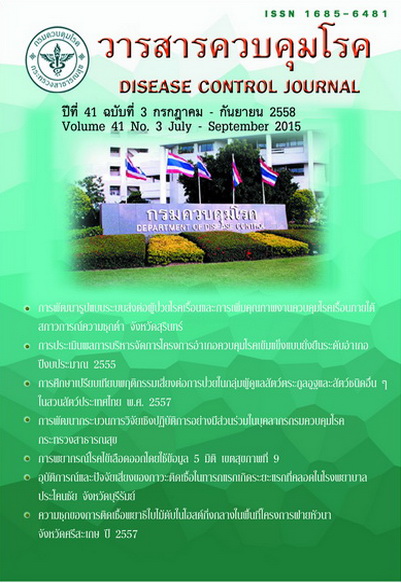Model development of referral system for leprosy patients and enhancement of quality of leprosy control under low endemic condition, Surin Province
DOI:
https://doi.org/10.14456/dcj.2015.11Keywords:
model development, leprosyAbstract
This study was conducted as the operational research. The study aimed at development of model of referral systems for leprosy patients and increase the quality of leprosy control under the low endemic conditions of Surin Province. We gathered information for the study through situation analysis, observation, academic documents, and leprosy experts' recommendation. The data from the observation and relating conferences provided the design of development pattern. The study was divided into 4 stages; (1) Studying and assessing operational situation of leprosy prevention and control. (2) Formulating a new model of referring system. (3) Following, and monitoring the operation according to the predetermined model. (4) Evaluating the results was. In 2014, we assessed of the operational results of leprosy control after developing the new referring system in Surin Province. We found that the competency and quality of leprosy control at Surin Province was changed more effectively, such as the formation of having the visit teams from several hospitals in Surin Province to visit the leprosy patient at home and perform contact examination. In addition, they also provided on the spot training to the village health volunteers about how to screen people with chronic skin diseases in order to find new leprosy patients. The finding number of new cases of leprosy patients in 2011-2014 had increased to 10, 21, 8, and 16 cases respectively. The number of new leprosy cases with disability grade 2 had decreased from 7 cases to 4 cases. The completion rate of treatment are likely to rise. They are more able to diagnose the new cases from household contact tracing. Thus, we recommend the other provinces to apply this referral system model by better utilization of regional hospital as hospitals at lower levels can help supporting contact tracing and screening of suspicious cases and sent to the regional hospital. Apart from that, they also recommended that survey for the leprosy patients' satisfaction toward the service of leprosy clinic should be conducted in order to evaluate the quality and effectiveness of the new referral system model. These will further enhance the quality and standard of the referral system of leprosy control under low endemic condition.
Downloads
References
2. ธีระ รามสูต. 50 ปี ราชประชาสมาสัยแห่งการสนองพระราชปณิธาน. กรุงเทพมหานคร: บริษัทมาสเตอร์คีย์ จำกัด; 2553.
3. จรูญ ปิรยะวราภรณ์. วิวัฒนาการงานควบคุมโรคเรื้อน, ใน: กรมควบคุมโรคติดต่อ, บรรณาธิการ. รายงานครบรอบ 15 ปี กรมควบคุมโรคติดต่อ. กรุงเทพมหานคร: โรงพิมพ์องค์การทหารผ่านศึก; 2533. หน้า. 19-28.
4. ธีระ รามสูต. แนวคิดการเกิดเชื้อดื้อยาและวิธีป้องกันแก้ไข. วารสารโรคติดต่อ 2522;1:256-74.
5. ธีระ รามสูต. ความก้าวหน้าและข้อปฏิบัติเกี่ยวกับการใช้ยาเคมีบำบัดโรคเรื้อนผสมแบบใหม่ตามข้อเสนอแนะขององค์การอนามัยโลก. แพทยสภาสาร 2530:10;5-13.
6. World Health Organization. Chemotherapy of leprosy for control program. Technical report series no.675. Geneva: World Health Organization; 1982.
7. ธีระ รามสูต. 40 ปี ของการบุกเบิกพัฒนาสู่ความสำเร็จของการกำจัดโรคเรื้อนในประเทศไทย.กรุงเทพมหานคร: บริษัท มาสเตอร์คีย์ จำกัด; 2553.
8. ธีระ รามสูต. การพัฒนากลวิธีการดำเนินงานควบคุมโรคเรื้อน ภายใต้สภาวะความชุกโรคลดลง. วารสารวิชาการสาธารณสุข 2539;5:279-95.
9. สถาบันราชประชาสมาสัย. รายงานประจำปี. นนทบุรี: สถาบันราชประชาสมาสัย; 2557.
10. ธีระ รามสูต, สมชาย รุ่งตระกูลชัย, ฉลวย เสร็จกิจ. ความสัมพันธ์ระหว่างแนวโน้มของอัตราความชุกและอัตราการค้นพบผู้ป่วยใหม่ที่เป็นจริงในประเทศไทย ในระยะเวลา 15 ปี หลังกำจัดโรคเรื้อนสำเร็จ ( ปี 2537-2550). วารสารควบคุมโรค 2552;35:124-37.
11. มยุรี ศิลป์ตระกูล. การพัฒนาบุคลากรสาธารณสุขของโรงพยาบาลชุมชน ภาคตะวันออกเฉียงเหนือ ในการดำเนินงานป้องกันความพิการผู้ป่วยโรคเรื้อน. นครราชสีมา: โจเซฟ พลาสติก แอนด์ ปริ้นท์; 2545.
12. จรูญ ปิรยะวราภรณ์. ปัจจัยที่เกี่ยวข้องกับความสำเร็จของการกำจัดโรคเรื้อนในประเทศไทย. วารสาร 2541;24:360-68.
13. สถาบันราชประชาสมาสัย. รายงานประจำปี. นนทบุรี: สถาบันราชประชาสมาสัย; 2547.
Downloads
Published
How to Cite
Issue
Section
License
Articles published in the Disease Control Journal are considered as academic work, research or analysis of the personal opinion of the authors, not the opinion of the Thailand Department of Disease Control or editorial team. The authors must be responsible for their articles.






